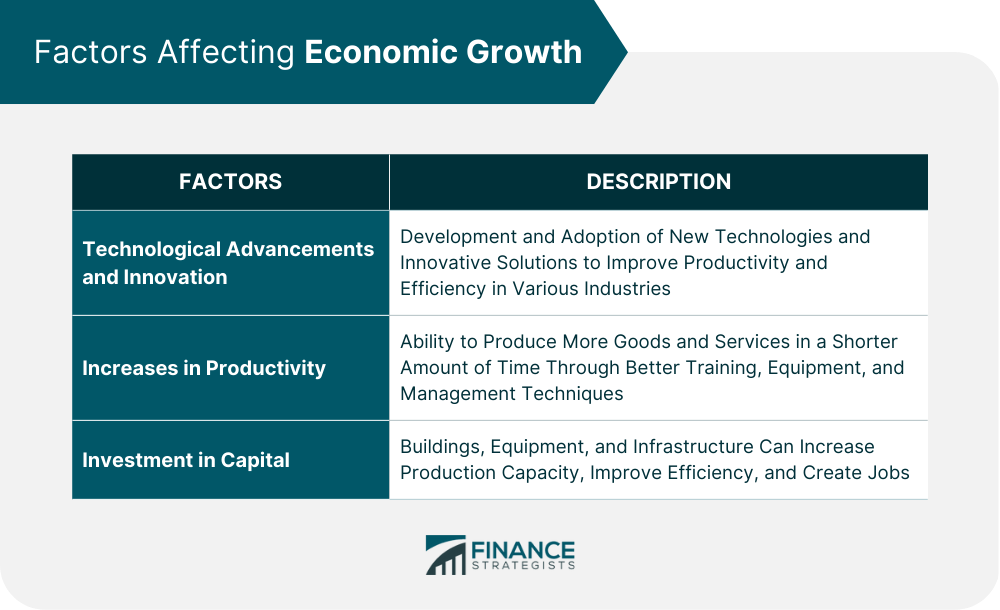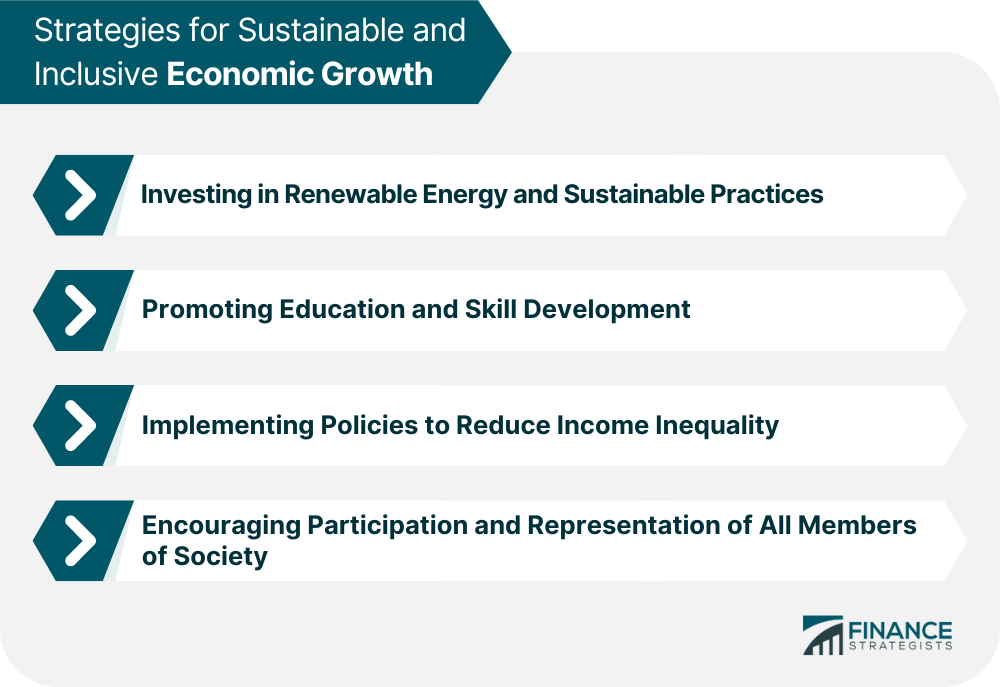The term economic growth denotes growth in the production of goods and services within a particular period, commonly assessed by using indicators such as Gross Domestic Product (GDP) or Gross National Product (GNP). It is a critical indicator of a country's economic health and can lead to higher employment rates, improved living standards, and increased investment. Economic growth is influenced by several factors, including technological advancements, increases in productivity, investment in capital, improvements in infrastructure, and government policies that promote entrepreneurship and innovation. Economic growth is influenced by various factors, including: Technological advancements and innovation can contribute significantly to economic growth by improving productivity and efficiency in various industries. New technologies can create new products and services, increase production capacity, and lower costs. Increases in productivity can lead to economic growth by enabling more goods and services to be produced in a shorter amount of time. This can be achieved through better training, equipment, and management techniques. Investment in capital, such as buildings, equipment, and infrastructure, can boost economic growth by increasing production capacity and improving efficiency. Capital investments can create jobs and stimulate demand for other goods and services. Improvements in infrastructure, such as roads, ports, and telecommunications systems, can enhance economic growth by facilitating the movement of goods and people, reducing transportation costs, and improving access to markets. Government policies that promote entrepreneurship and innovation, such as incentives, subsidies, and research and development funding, can encourage private sector investment and stimulate economic growth. All of these factors work together to drive economic growth and increase productivity, but their impact can differ depending on the specific circumstances of each country and region. Economic growth can be measured in several ways, including: GDP and GNP are the most commonly used measures of economic growth. GDP measures the total value of goods and services produced within a country's borders. GNP measures the total value of goods and services produced by a country's citizens, regardless of their location. These measures provide an overall picture of a country's economic performance. While GDP and GNP provide useful information about economic growth, they do not tell the whole story. Other indicators, such as employment rates and income levels, can provide a more detailed understanding of how economic growth affects different population segments. For example, if GDP is growing, but employment rates are stagnant, it may indicate that economic growth's benefits are not evenly distributed. Overall, measuring economic growth is important for assessing the performance of an economy and identifying areas for improvement. However, it is important to use a range of indicators to get a complete picture of economic growth and its impact on different segments of society. While economic growth can bring many benefits, it also presents several challenges, including: Economic growth often requires using natural resources, which can lead to environmental degradation and contribute to climate change. Suppose economic growth is not pursued sustainably. In that case, it can have long-term negative environmental consequences, including biodiversity loss, air and water pollution, and increased greenhouse gas emissions. Economic growth does not necessarily lead to a more equitable distribution of wealth and income. In fact, it can sometimes exacerbate income inequality, as the benefits of economic growth may primarily benefit the wealthiest members of society. This can lead to social tensions and instability. Economic growth can also lead to social unrest if it is not inclusive and does not benefit all members of society. If certain groups feel left behind or excluded from the benefits of economic growth, it can lead to protests, strikes, and other forms of social unrest. Governments and policymakers need to pursue sustainable and inclusive economic growth that benefits all members of society and protects the environment for future generations. To promote sustainable and inclusive economic growth, governments, and policymakers can consider implementing the following strategies: Investing in renewable energy and sustainable practices can help reduce the environmental impact of economic growth while creating new jobs and economic opportunities. This can include investments in clean energy infrastructure, such as solar and wind power, and policies to promote energy efficiency and reduce waste. Investing in education and skill development can help prepare workers for the jobs of the future and ensure that everyone has access to the training and resources they need to participate in the economy. This can include investments in vocational training programs, apprenticeships, and lifelong learning opportunities. Policies that promote income equality, such as progressive taxation, minimum wage laws, and social safety net programs, can help ensure that the benefits of economic growth are shared more equitably across society. This can help reduce social tensions and promote greater social cohesion. Ensuring that all members of society have a voice in economic decision-making and access to economic opportunities is critical for promoting inclusive economic growth. This can include policies to promote greater diversity and representation in the workforce, as well as initiatives to promote entrepreneurship and small business development. By pursuing these strategies, governments and policymakers can promote sustainable and inclusive economic growth that benefits all members of society while protecting the environment for future generations. Economic growth is a critical indicator of a country's economic health and can lead to higher employment rates, improved living standards and increased investment. However, economic growth has challenges, including environmental degradation, income inequality, and social unrest. In order to encourage economic growth that is both sustainable and inclusive, policymakers and governments can adopt a variety of approaches. These may include investing in renewable energy and sustainable practices, promoting education and skills training, implementing policies to reduce income inequality, and fostering the participation and representation of all members of society. By pursuing these strategies, we can create a more just and sustainable economy that benefits everyone. The World Bank provides additional information and resources affecting economic growth, which can be beneficial to individuals, communities, and policymakers in ensuring that economic growth is pursued in a responsible and inclusive manner. Similarly, wealth management services are key in providing guidance to address challenges related to economic growth and creating customized investment strategies.What Is Economic Growth?
Factors Affecting Economic Growth
Technological Advancements and Innovation
Increases in Productivity
Investment in Capital
Improvements in Infrastructure
Government Policies That Promote Entrepreneurship and Innovation

Measuring Economic Growth
Gross Domestic Product (GDP) and Gross National Product (GNP)
Other Indicators of Economic Growth, Such as Employment Rates and Income Levels
Challenges of Economic Growth
Environmental Degradation and Sustainability
Income Inequality
Social Unrest
Strategies for Sustainable and Inclusive Economic Growth
Investing in Renewable Energy and Sustainable Practices
Promoting Education and Skill Development
Implementing Policies to Reduce Income Inequality
Encouraging Participation and Representation of All Members of Society

Final Thoughts
Economic Growth FAQs
Economic growth refers to increased production of goods and services over time and is a critical indicator of a country's economic health. It can lead to higher employment rates, improved living standards, and increased investment.
Economic growth can lead to environmental degradation, income inequality, and social unrest if not pursued in a responsible and inclusive manner.
Strategies for promoting sustainable and inclusive economic growth include investing in renewable energy and sustainable practices, promoting education and skill development, implementing policies to reduce income inequality, and encouraging participation and representation of all members of society.
Individuals can take action by educating themselves on the impacts of economic growth and advocating for policies that promote sustainable and inclusive economic growth in their communities. This could include supporting renewable energy projects, volunteering with education and training programs, and engaging with local policymakers.
Pursuing economic growth in a responsible and inclusive manner is important to ensure that the benefits of economic growth are shared equitably across society and that the environment is protected for future generations. It can also help reduce social tensions and promote greater social cohesion.
True Tamplin is a published author, public speaker, CEO of UpDigital, and founder of Finance Strategists.
True is a Certified Educator in Personal Finance (CEPF®), author of The Handy Financial Ratios Guide, a member of the Society for Advancing Business Editing and Writing, contributes to his financial education site, Finance Strategists, and has spoken to various financial communities such as the CFA Institute, as well as university students like his Alma mater, Biola University, where he received a bachelor of science in business and data analytics.
To learn more about True, visit his personal website or view his author profiles on Amazon, Nasdaq and Forbes.











